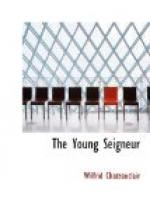Zotique was like the Mephistopheles he resembled, one of those who have been every where, seen much, done everything. Born respectably,—a cousin of L’Honorable’s—he had executed in his younger days a record of pranks upon the neighbors, which at a safe-distance of time became good humoredly traditional. The trial and despair of Pere Galibert, and the disapproved of Chamilly’s father, he ran away to Trois-Rivieres as soon as he knew enough to do so; thence to Montreal, and Joliette; and a Fur Post near Saipasou (or, “Nobody-knows-Where,” for Zotique asserts the region has that name); then was a veracious steamboat guide for tourists to the Gulf; edited a comic weekly at Quebec, “illustrated” it, itself cheerfully and truly confessed, “with execrable wood-engravings;” as Papal Zouave, he embarked for Rome to gallant in voluminous trousers on four sous a day; fought wildly, for the fun of it, at the Pia Gate against Victor Emmanuel’s red-shirted patriots,—and came back to Dormilliere disgusted. The Registrarship of the county being vacant, a pious government appointed him to the position, upon recommendation by the “high Clergy,” as a martyr for the good cause; and on a similar sacred ground he obtained the passage of a private bill through the Legislature, admitting him to the honorable profession of notary without the trouble of studying.
So it came to pass that our friend was installed in the Registry Office end of the long cottage known as the Circuit Court House, and made use of the Court Hall itself for his Sunday receptions to the people.
The people themselves were worth a brief catalogue.
Jacques Poulin, the horse trader, stood against a window, with his big straw hat on. His trotting sulky was outside. Gagnant, the established merchant, with contented reticence of well-to-do-ness, was remarking of some enterprise, “It won’t pay its tobacco.” Toutsignant, his insecure and overdaring young rival; who was bound to cut trade, and let calculation take care of itself, sat on the opposite side of the room, and, bantering with him, the shrewd habitants, Bourdon and Desrochers, who were to profit by his theory of an advance in rye. The young doctor, Boucher from Boucherville, leaned near, superior in broad-cloth frock coat, red tie, and silk hat. Along a bench, squeezed a jolly half-dozen “garcons," and a special mist of tobacco smoke hung imminent over their heads. About the floor, the windows, the corners of the room, the bar of the court, sat, lounged, smoked, and stood, in friendly groups, a host of neighbors, amiably listening, more or less, to Zotique’s harangues and conversations. It cannot be said, however, that they abated much of their own little discussions. Every now and then some private Babel would break in like a surge, over the general noise, and attract attention for an instant.
“The auto-da-fe—alas, it recalls me the ravishing country of Spain! O those Sierras!—those Vegas! the mountains shirting with snow! the green plains watered!—but misere! hot as—the disposition of the Cure. To-day, gentlemen, the affair becomes serious, for lo, the approach of a doubtful election, and a trifle of clerical interference, like a seed upon the balance, might well—” the sentence was appendixed by an explosive shrug.




